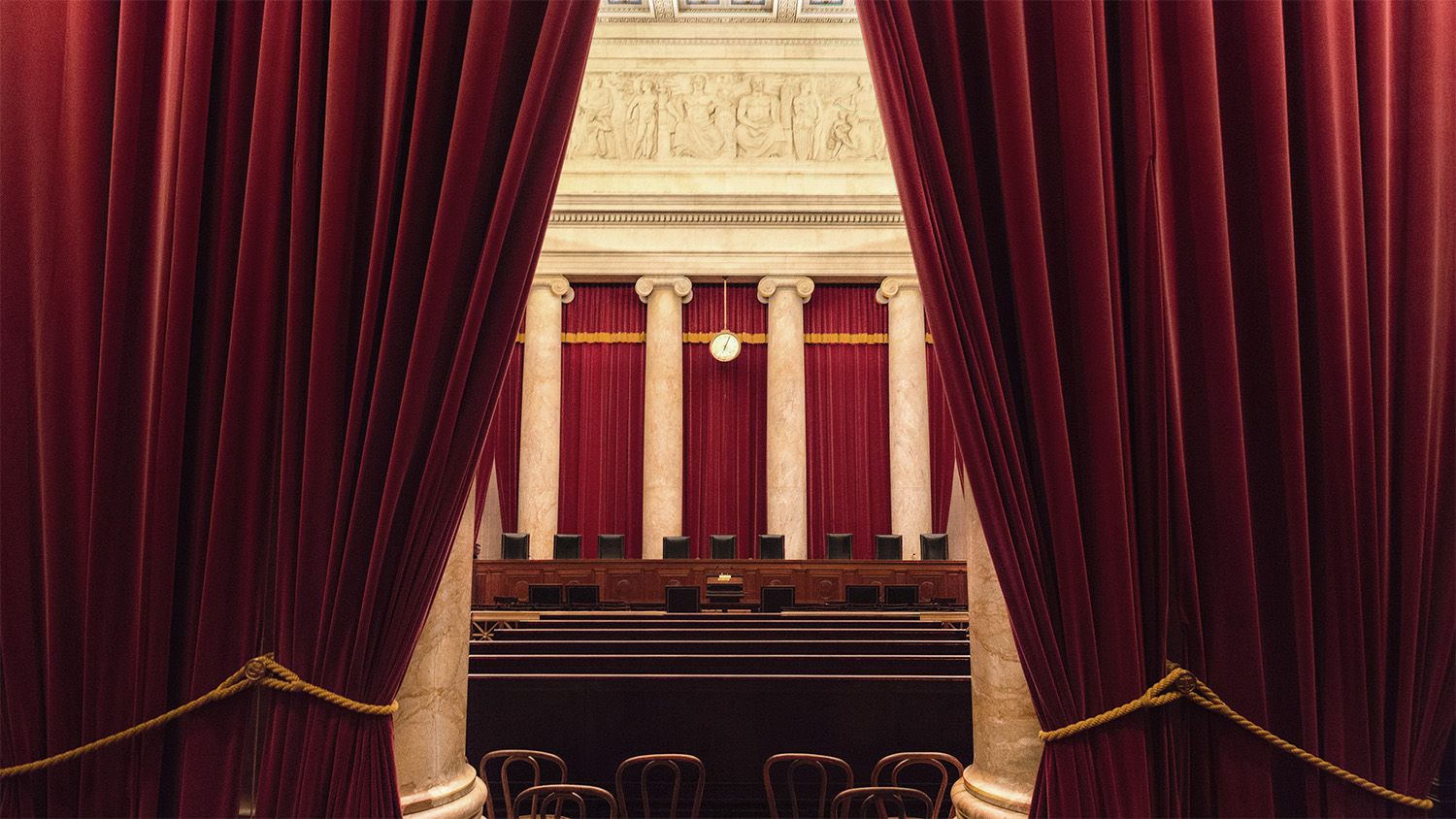Authority: The Kansas Code of Judicial Conduct
Author: Dr. Michael H. Hoeflich
This article is featured in Volume 4, Number 5 of the Legal Ethics and Malpractice Reporter.
Last month’s feature article discussed the problem of the appearance of improper activities by members of the United States Supreme Court. Controversy over the need for imposing ethical rules upon the justices of the Supreme Court continues as Chief Justice Roberts and other justices work to improve the public image of the Court. This month, we can do what physicists refer to as a “thought experiment.” Let us imagine that the justices of the United States Supreme Court were subject to the Kansas Code of Judicial Conduct. Kansas Supreme Court Rule 601B contains the Canons and Rules governing Kansas judges’ professional conduct. The Preamble reads:
[1] An independent, fair and impartial judiciary is indispensable to our system of justice. Our legal system is based upon the principle that an independent, impartial, and competent judiciary, composed of men and women of integrity, will interpret and apply the law that governs our society. Thus, the judiciary plays a central role in preserving the principles of justice and the rule of law. Inherent in all the Rules contained in this Code are the precepts that judges, individually and collectively, must respect and honor the judicial office as a public trust and strive to maintain and enhance confidence in the legal system.
[2] Judges should maintain the dignity of judicial office at all times, and avoid both impropriety and the appearance of impropriety in their professional and personal lives. They should aspire at all times to conduct that ensures the greatest possible public confidence in their independence, impartiality, integrity, and competence.
[3] The Kansas Code of Judicial Conduct establishes standards for the ethical conduct of judges and judicial candidates. It is not intended as an exhaustive guide for the conduct of judges and judicial candidates, who are governed in their judicial and personal conduct by general ethical standards as well as by the Code. The Code is intended, however, to provide guidance and assist judges in maintaining the highest standards of judicial and personal conduct, and to provide a basis for regulating their conduct through disciplinary procedures.
The preamble not only explains the underlying reasons as to why we have a Code of Judicial Conduct; it gives insight into the spirit of the Code—a spirit which should be embraced by every judge in the State.
The Code contains four canons of conduct:
Canon 1 – A Judge Shall Uphold and Promote the Independence, Integrity, and Impartiality of the Judiciary, and Shall Avoid Impropriety and the Appearance of Impropriety.
Canon 2 – A Judge Shall Perform the Duties of Judicial Office Impartially, Competently, and Diligently.
Canon 3 – A Judge Shall Conduct the Judge’s Personal and Extrajudicial Activities to Minimize the Risk of Conflict with the Obligations of Judicial Office.
Canon 4 – A Judge or Candidate for Judicial Office Shall Not Engage in Political or Campaign Activity That Is Inconsistent with the Independence, Integrity, or Impartiality of the Judiciary.
Each of these four canons is interpreted and supplemented by authoritative rules that deal with specific situations a Kansas judge may face.
The Kansas rule that would be most relevant to the problems plaguing the Supreme Court—questionable disclosure practices, relationships between judges and wealthy individuals, etc.—would fall most directly under Canon 1’s “appearance of impropriety” regulation on judicial behavior. Although commentators have often criticized this standard, it remains the rule in Kansas and many states. Rule 1.2 reads:
Promoting Confidence in the Judiciary
A judge shall act at all times in a manner that promotes public confidence in the independence, integrity, and impartiality of the judiciary, and shall avoid impropriety and the appearance of impropriety.
COMMENT
[1] Public confidence in the judiciary is eroded by improper conduct and conduct that creates the appearance of impropriety. This principle applies to both the professional and personal conduct of a judge.
[2] A judge should expect to be the subject of public scrutiny that might be viewed as burdensome if applied to other citizens and must accept the restrictions imposed by the Code.
[3] Conduct that compromises or appears to compromise the independence, integrity, and impartiality of a judge undermines public confidence in the judiciary. Because it is not practicable to list all such conduct, the Rule is necessarily cast in general terms.
[4] Judges should participate in activities that support ethical conduct among judges and lawyers, professionalism within the judiciary and the legal profession, and access to justice for all.
[5] Actual improprieties include violations of law, court rules, or provisions of this Code. The test for appearance of impropriety is whether the conduct would create in reasonable minds a perception that the judge violated this Code or engaged in other conduct that reflects adversely on the judge’s honesty, impartiality, temperament, or fitness to serve as a judge.
[6] A judge may initiate and participate in community outreach activities for the purpose of promoting public understanding of and confidence in the administration of justice. In conducting such activities, the judge must act in a manner consistent with this Code.
Comments 3 and 5 are particularly relevant to the behavior making headlines in recent months. If we were to apply these standards to the justices’ behavior, how would they fare? Have any of them acted in a manner that “would create in reasonable minds a perception that the judge violated this Code or engaged in other conduct that reflects adversely on the judge’s honesty, impartiality, temperament, or fitness to serve as a judge”?
Some of the alleged activities might well run afoul of the standards set forth in Kansas Rule 1.2 as interpreted in Comments 3 and 5 to that Rule. That is, a “reasonable person” might well believe (assuming the veracity of the reports) that one or more of the justices has acted in a manner that reflects adversely on his or her impartiality, temperament, or fitness to serve as a member of the highest court in the land.
This raises a crucial issue for every citizen. Should the most powerful and visible judges in the United States be subject to ethical rules less stringent than those by which other judges are constrained? Will the public continue to have confidence in a court whose rulings profoundly shape American society and culture when the members of this court have fewer ethical responsibilities than local judges with far less power?
Much of the debate about the Supreme Court has focused on its uniqueness. In many respects, it is. But the Court is still a court, and the justices are still judges. And many people would be shocked at the lack of formal ethical obligations imposed on U.S. Supreme Court justices compared to judges presiding over courts in their own states. Avoiding the appearance of impropriety, alone, provides a compelling basis for the U.S. Supreme Court act to adopt more stringent formal ethical rules and not wait for others to do so legislatively.
READ THE FULL ISSUE OF LEMR, Vol. 4, No. 5
About Joseph, Hollander & Craft LLC
Joseph, Hollander & Craft is a mid-size law firm representing criminal defense, civil defense, personal injury, and family law clients throughout Kansas and Missouri. From our offices in Kansas City, Lawrence, Overland Park, Topeka and Wichita, our team of 25 attorneys covers a lot of ground, both geographically and professionally.
We defend against life-changing criminal prosecutions. We protect children and property in divorce cases. We pursue relief for clients who have suffered catastrophic injuries or the death of a loved one due to the negligence of others. We fight allegations of professional misconduct against medical and legal practitioners, accountants, real estate agents, and others.
When your business, freedom, property, or career is at stake, you want the attorney standing beside you to be skilled, prepared, and relentless — Ready for Anything, come what may. At JHC, we pride ourselves on offering outstanding legal counsel and representation with the personal attention and professionalism our clients deserve. Learn more about our attorneys and their areas of practice, and locate a JHC office near you.











